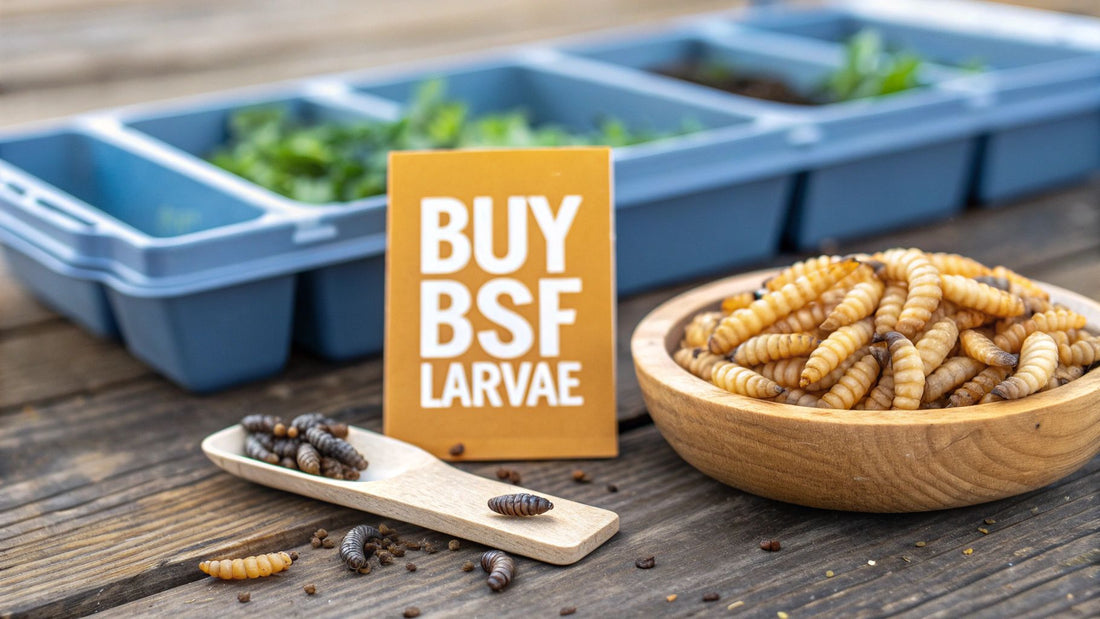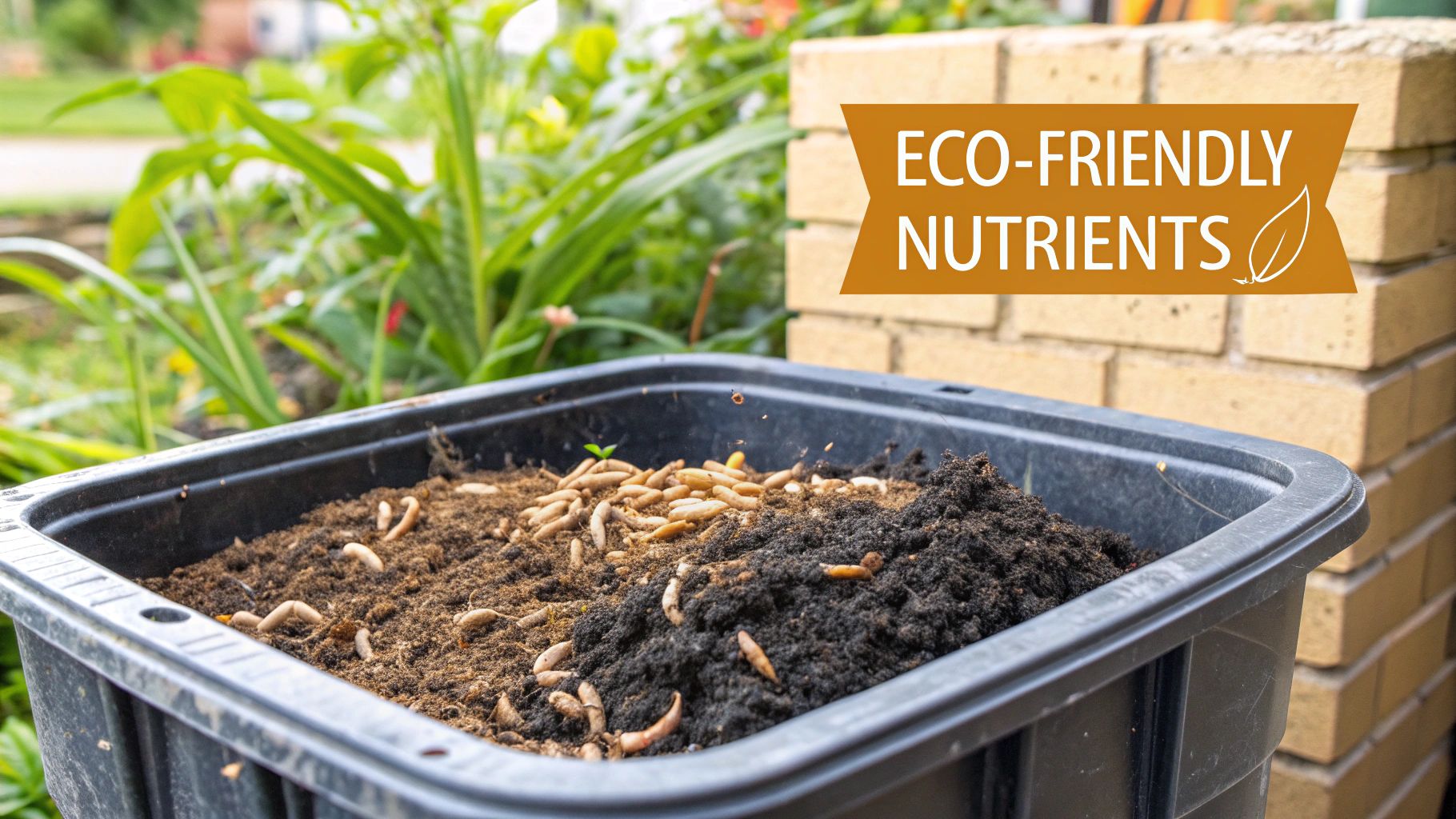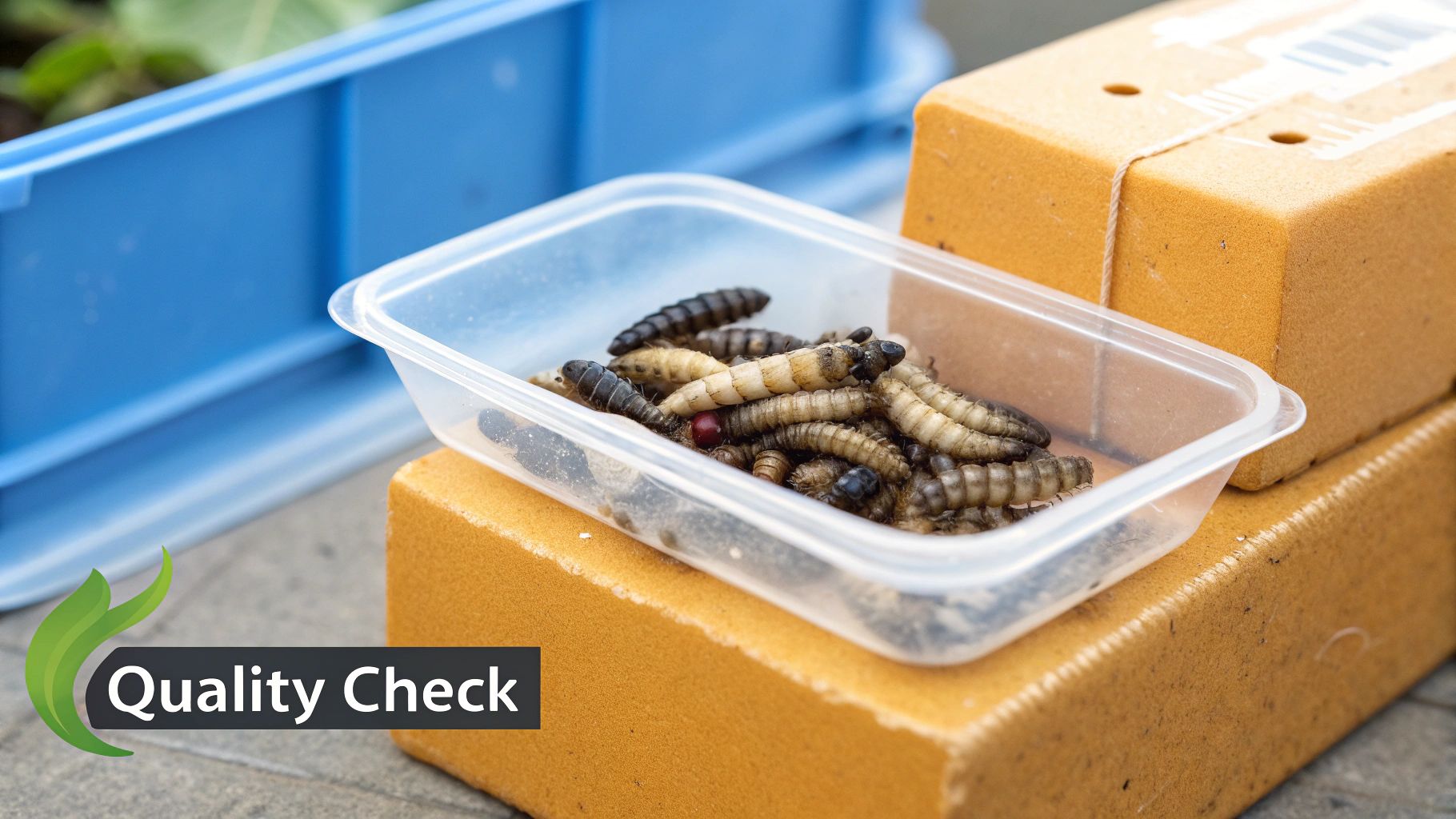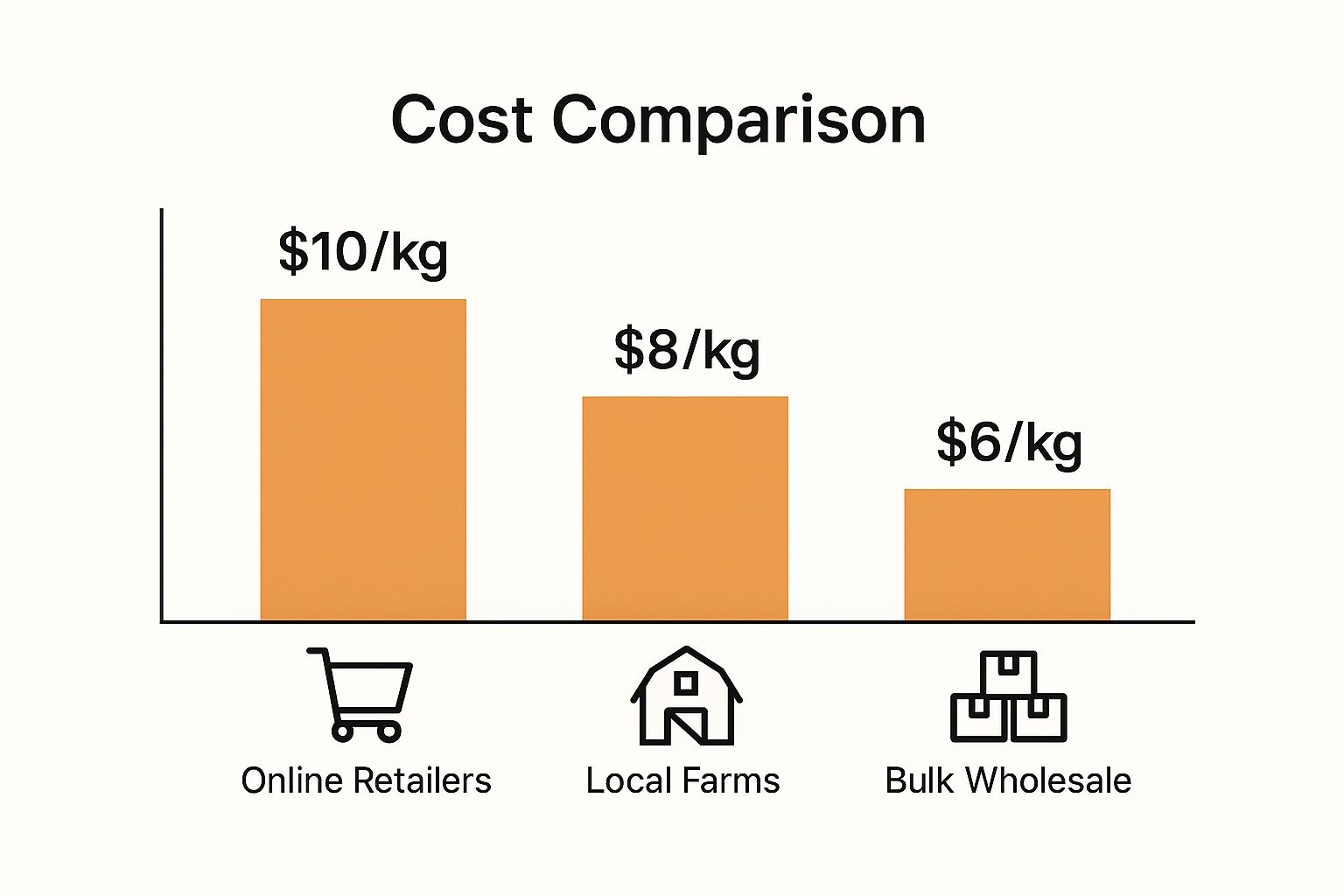
Where to Buy Black Soldier Fly Larvae a Buyer's Guide
Share
So, you're ready to get your hands on some Black Soldier Fly larvae, but where do you even start? Your main choices boil down to specialized online shops, local farms or breeders, and sometimes, the big-name pet supply stores. Going online is all about convenience and selection, while buying local gets you super-fresh larvae and lets you support a neighborhood business.
Your Guide To Finding The Best BSF Larvae Suppliers

Finding the right place to buy Black Soldier Fly (BSF) larvae is the first, most important step. Think of it less like grabbing a bag of birdseed and more like choosing a premium health supplement for your animals. The quality of the larvae you buy directly impacts the results you see, whether that's stronger eggshells from your chickens, a calcium boost for your bearded dragon, or a supercharged compost pile.
Your specific needs are what will ultimately point you toward the perfect supplier. And that journey really begins with figuring out which form of larvae is right for you.
Live vs. Dried vs. Powdered Larvae
The most common decision you'll face is whether to get live or dried larvae. Live larvae are fantastic for picky eaters. The wiggling motion triggers a natural hunting instinct in chickens and reptiles that they just can't resist. While they're the pinnacle of freshness, they don't last as long and need to be handled carefully.
On the flip side, dried larvae are the definition of convenience. They last for ages, are a breeze to store, and pack a serious punch of protein and calcium without the fuss of keeping insects alive. This is why they’re a go-to for most backyard chicken keepers and people feeding wild birds.
Then there's powdered BSF larvae, which is a great option for mixing into custom feed formulas for livestock or fish, making sure every single bite is packed with consistent nutrition. The form you choose really dictates how you'll use them and, by extension, the best place to buy them.
Choosing a supplier isn't just about finding the lowest price. It's about finding a partner who cares about quality, safety, and sustainable farming. A great provider gives you peace of mind that you're getting a product that's both safe and bursting with nutrients.
Where To Start Your Search
Figuring out where to shop is pretty simple once you know the lay of the land. Each type of supplier has its own set of perks.
Before you start clicking "add to cart," it helps to have a clear picture of who's who in the world of BSF suppliers. This quick comparison should help you narrow down the best fit for your situation.
Quick Comparison of BSF Larvae Suppliers
| Supplier Type | Best For | Pros | Cons |
|---|---|---|---|
| Specialized Online Retailers | Quality-conscious buyers seeking convenience and detailed product info. | Direct-from-producer freshness, high quality control, transparent sourcing. | Can have higher shipping costs, no option to see the product beforehand. |
| Local Farms/Breeders | People needing the freshest live larvae and wanting to support local business. | Ultimate freshness, no shipping stress, supporting the local economy. | Limited availability, may not have dried options, inconsistent supply. |
| Large Pet Supply Chains | Quick, convenient purchases for specific pets like reptiles or birds. | Easy to find locally, often carry smaller, pet-specific quantities. | Quality can be inconsistent, less information on sourcing, may be more expensive per ounce. |
Ultimately, whether you go with a dedicated online store or a farm down the road, the goal is to find a reliable source you can trust.
Specialized companies, for instance, often focus entirely on producing high-quality, USA-grown larvae, which gives you confidence in what you're feeding your animals. You can even learn more about the mission behind a quality supplier by exploring their story and commitment to sustainable practices.
Here’s a quick breakdown of your primary options:
- Specialized Online Retailers: These are often the farmers themselves, selling directly to you. This usually means you get a super fresh, high-quality product with lots of info on nutrition and where the grubs came from.
- Local Farms and Breeders: Buying from a local source can mean getting the freshest live larvae possible. Plus, you get to support a small business in your own community.
- Large Pet Supply Chains: Your local brick-and-mortar pet store (and its website) might carry BSF larvae, typically packaged and branded for specific pets, like reptiles.
So, What's All the Fuss About These Little Grubs?

Before we dive into where to buy Black Soldier Fly (BSF) larvae, it’s worth taking a moment to understand why they've suddenly become a hot commodity. Think of it like the discovery of a new superfood, but this one is for animal nutrition and the health of our planet. These aren't just another feeder insect; they represent a major shift toward smarter, more responsible food systems.
The demand is absolutely booming, and for a good reason. The traditional protein sources we rely on for animal feed, mainly fishmeal and soy, are putting a massive strain on the planet. Overfishing is emptying our oceans, and soy cultivation is a notorious driver of deforestation. BSF larvae offer a powerful, sustainable way out of this dilemma.
The market numbers tell the story. The global BSF market was valued at around $11.09 billion and is projected to skyrocket to $68.09 billion by 2032. This isn't just a niche trend; it's a direct response to the animal feed industry's desperate need for proteins that can keep up with demand without wrecking the environment. You can dig deeper into these numbers in this detailed report on the BSF industry.
Nutrition and Recycling Rolled into One
Here’s where BSF larvae get really interesting. They play a dual role as both a nutritional powerhouse and a world-class cleanup crew. They are nature's ultimate recyclers, masterfully designed to chow down on organic waste and convert it into high-quality protein and fats. It's a skill that puts them right at the heart of the circular economy.
Just picture all the pre-consumer food waste from restaurants, breweries, and grocery stores that usually ends up rotting in a landfill. BSF larvae eat that stuff up, turning what would be pollution into a valuable resource. It’s a beautifully simple closed-loop system: waste becomes food, which in turn feeds the animals we raise.
And the final product? It’s not just sustainable; it’s incredibly nutritious.
- High-Quality Protein: BSF larvae are loaded with the essential amino acids that are critical for everything from healthy feather growth in chickens to muscle development in fish.
- Healthy Fats: They’re a great source of beneficial lipids, including lauric acid, which has natural antimicrobial properties that can boost gut health in animals.
- Calcium-Rich: This is a big one. Unlike crickets or mealworms, BSF larvae have a naturally balanced calcium-to-phosphorus ratio, which is vital for strong bones in reptiles and quality eggshells in poultry.
The real magic of BSF larvae is their sheer efficiency. They can turn low-value organic waste into a premium feed ingredient with a tiny environmental footprint, all while using a fraction of the land and water needed for traditional crops.
A Greener Choice Than You'd Think
When you decide where to buy Black Soldier Fly larvae, you’re doing more than just getting a nutritious treat for your animals. You're casting a vote for a more sustainable future. The difference between BSF and conventional feeds is night and day.
Let’s put them head-to-head with the two old-school industry giants:
| Feed Source | The Environmental Cost | The Sustainability Problem |
|---|---|---|
| Fishmeal | Harvested from wild-caught "forage fish" like anchovies and sardines. | Fuels overfishing, messes up marine food webs, and is resource-intensive to process. |
| Soybean Meal | A primary driver of deforestation, especially in critical ecosystems like the Amazon rainforest. | Demands huge amounts of land, water, and fertilizers, which leads to habitat destruction and soil damage. |
| BSF Larvae | Can be farmed vertically on a small land footprint, thriving on organic waste. | Cuts down on landfill waste, lowers greenhouse gas emissions, and conserves our precious natural resources. |
This simple chart makes it obvious why so many industries, from aquaculture to pet food, are making the switch to insect protein. By choosing BSF larvae, you’re actively supporting a solution that reduces our reliance on these environmentally damaging resources. Your purchase helps fuel a system that turns waste into a valuable commodity, delivering top-tier nutrition while helping to heal the planet.
Evaluating the Top Online BSF Larvae Retailers

Shopping online for Black Soldier Fly larvae can feel a bit like the wild west at first. Dozens of sellers are all claiming to have the best product, but how can you really tell the good stuff from the junk?
The trick is to stop thinking of it as just buying a bag of bug treats and start thinking of it like you're sourcing a high-quality health supplement for your animals. This simple shift in mindset makes all the difference because, believe me, not all larvae are created equal. Their nutritional punch comes directly from how they were raised, what they ate, and how they were processed. A truly great retailer will be an open book about all of this.
Decoding the Product Page
Think of a product page as the larvae’s resume. Your job is to look past the flashy marketing and find the real story. It's easy to get drawn in by a low price, but the details that impact your animals' health are what really matter.
Here’s what I always look for on the page:
- Country of Origin: Is it clearly stated? USA-grown larvae, for example, are a big green flag. They’re typically raised under much stricter quality and safety guidelines than imports from unknown sources.
- Farming Practices: Do they give you any insight into how they farm? Keep an eye out for phrases like "sustainably farmed" or mentions of their facilities being FDA-compliant.
- The Larvae's Diet: This is a huge one. Larvae fed high-quality, pre-consumer plant-based diets are nutritional powerhouses compared to those raised on manure or mystery waste.
- Nutritional Analysis: A reputable brand won't be shy about showing a guaranteed analysis. This little chart tells you the minimum percentages of protein, fat, and—most importantly—calcium.
When a company puts this information front and center, it shows they’re confident in what they’re selling. They have nothing to hide.
Product Range and Guarantees
Beyond the quality clues, a top-notch retailer knows that one size doesn't fit all. The needs of a reptile owner buying a small batch of live larvae are completely different from a chicken keeper looking to buy in bulk.
A well-rounded product line is a great sign. Look for:
- Different Forms: The best suppliers will offer both live and dried larvae. This gives you options depending on your animals' preferences and your storage needs.
- Multiple Sizes: Offering everything from small 1-pound bags to larger 5 or 10-pound boxes shows they cater to everyone, from a hobbyist with one bearded dragon to a farmer with a whole flock.
- Clear Guarantees: If you're buying live larvae, a "Live Arrival Guarantee" is an absolute must. It’s the company's promise that they stand behind their product and their shipping methods.
When a company offers this kind of variety, it shows they actually understand their customers. For instance, you can often find premium, USA-grown black soldier fly larvae in various sizes that are marketed specifically for backyard chickens, which tells you they've really honed in on that specific need.
Remember, price is only one part of the story when you're comparing sellers. A slightly higher price tag often reflects better farming, rigorous safety testing, and a fresher, more nutrient-packed product in the end.
Comparing Top Contenders
Let's walk through a real-world comparison. Imagine you’ve narrowed your search down to three different online stores. This is typically what you'll find:
| Feature | Retailer A (Premium Brand) | Retailer B (Budget Importer) | Retailer C (General Pet Supply) |
|---|---|---|---|
| Origin | Clearly labeled "Grown in the USA" | "Imported" or not specified | Brand name, origin unclear |
| Larvae Diet | Fed a plant-based, pre-consumer diet | Diet information not provided | Unknown |
| Safety Testing | Batch-tested for heavy metals | No mention of safety testing | No mention of safety testing |
| Live Guarantee | Yes, clear policy stated | No guarantee offered | Not applicable (only sells dried) |
| Customer Reviews | Consistently high, mention quality | Mixed, complaints about quality | Few product-specific reviews |
As you can see, Retailer A gives you a level of transparency and peace of mind that the others just can't match. You might pay a little more, but you're paying for confidence. You know exactly what you’re feeding your animals: a safe, nutritious, and high-quality product.
This is especially critical if you have laying hens. Contaminants like heavy metals can potentially pass through to their eggs. By choosing a supplier that tests for nasty stuff like lead, arsenic, and mercury, you're protecting not just your flock, but your family, too. At the end of the day, picking the right online retailer is a true investment in health and quality.
How to Find Local Black Soldier Fly Larvae Suppliers
While clicking "buy now" online is easy, there's something to be said for sourcing Black Soldier Fly larvae from a local supplier. It's like the difference between buying produce from a massive supermarket chain and getting it from your neighborhood farmers' market. Both work, but the local option often means a fresher product and a direct line to the person who grew it.
If you've been wondering where to buy black soldier fly larvae in person, you might be surprised at how many options are hiding in plain sight. Buying local is a game-changer, especially if you need live larvae. It takes all the guesswork and stress out of shipping live bugs, guaranteeing you get a batch of healthy, wiggling larvae. Better yet, you can see what you’re buying before you pull out your wallet.
Your Roadmap to Finding Local Sellers
Your hunt for a local BSFL supplier will probably still start online, just with a much tighter focus. You have to think locally. Forget broad searches; simple, targeted phrases are what you need.
Try plugging these into your search engine:
- "Black soldier fly larvae near me"
- "BSF farm [your city or state]"
- "Live feeder insects for sale [your town]"
- "Local poultry feed supplier"
These kinds of searches often unearth the hidden gems—the small-scale farms, independent breeders, or specialty pet shops that don't pop up on the first page of a national search. You could discover an amazing producer just a few miles down the road.
Tapping into Niche Communities
Sometimes, the best suppliers aren't found through Google at all. They're discovered through word-of-mouth in communities of people who are just as passionate about this stuff as you are. These groups are goldmines for solid recommendations because the members are out there every day, actually using the products.
Get connected with groups like these:
- Poultry and Homesteading Clubs: Hop on social media and look for local backyard chicken or homesteading groups. People in these communities love to share their go-to sources for quality feed and treats.
- Reptile Expos and Shows: These events are basically conventions for live feeder vendors. It's an incredible chance to meet multiple suppliers face-to-face, compare their larvae side-by-side, and ask all your questions at once.
- Sustainable Farming Networks: Check with your local agricultural extension office or sustainable farming organizations. They often keep lists of local BSF producers who are focused on turning waste into high-value feed.
When you connect with these communities, you're doing more than just finding a seller—you're building a network. A good local farmer can become a trusted partner, offering advice and a steady supply of fresh larvae perfectly suited for your needs.
Key Questions to Ask a Local Supplier
Okay, so you've found someone local. Now it's time to do a little homework. A quick chat can tell you everything you need to know about their quality and safety standards. Think of it as a brief interview to make sure they're the right fit.
Don't leave without asking these questions:
- What do you feed your larvae? This is non-negotiable. You want to hear that they use clean, pre-consumer organic material, like spent grains from a brewery or unsold produce from a farm. Steer clear of anyone raising their larvae on post-consumer garbage or manure, which can harbor nasty pathogens.
- Can I see your operation? A transparent farmer is usually a proud one. If they're happy to give you a peek at their clean, well-run facility, that's a huge green flag. It’s your chance to see their practices firsthand.
- Do you offer different sizes or life stages? A great local breeder can often customize your order, providing specific larval sizes or even pupae if you're thinking about starting your own BSF colony.
Finding a trustworthy local supplier isn't just about convenience. It’s about getting peace of mind, unmatched freshness, and a direct connection to the person producing food for your animals.
What to Look for When Assessing Larvae Quality
Once you’ve narrowed down your list of potential suppliers, it’s time to put on your inspector’s hat. Learning how to spot high-quality Black Soldier Fly larvae is the only way to make sure you're getting the nutritional punch you're paying for.
Think of it like picking out the best fruit at the market—you instinctively know which apple is crisp and which one is mealy. The same idea applies here. A few simple visual and sensory cues can tell you everything you need to know about the quality of the larvae.
Whether you're buying them live or dried, the signs are different but equally important. For live larvae, you’re looking for health and vigor. For dried larvae, it’s all about how well they were processed and preserved. Getting this right means you can ask suppliers the right questions and feel confident you’re investing in a top-notch product for your animals.
Judging the Quality of Live Larvae
When a box of live BSF larvae lands on your doorstep, the first thing you should see is action. Healthy, fresh larvae are constantly wiggling and moving around. If the batch is sluggish or motionless, that's a huge red flag. It usually means they were stressed during shipping, are getting old, or weren't kept in the right conditions.
Next, take a good look at their appearance. High-quality live larvae should have:
- A vibrant color: You want to see a creamy white to a light tan shade. Larvae that look very dark brown or black are probably about to pupate. At that stage, they stop eating, and their nutritional makeup—especially their fat content—starts to change.
- Size consistency: Some variation is normal, but a batch with a jumble of wildly different sizes might point to a sloppy breeding and harvesting process. Uniformity is a sign of a well-run farm.
- A clean, earthy smell: Healthy larvae should smell pretty neutral, maybe a little bit like fresh soil. If you catch a whiff of anything foul, like ammonia or rot, it's a dead giveaway that something is wrong—either the larvae are spoiling or the farm's hygiene is poor.
Assessing Dried BSF Larvae
Dried larvae are fantastic for their convenience and long shelf life, but their quality is just as variable as their live cousins. The drying process is everything. Done right, it locks in all the good stuff. Done wrong, it can ruin them.
Your nose is one of your best tools here. High-quality dried larvae should smell nutty and savory, kind of like roasted seeds. If they smell rancid, sour, or musty, the fats have gone bad, and you should steer clear.
Beyond the smell, just look at them. You want to see whole, intact larvae. A bag filled with broken bits and dust means they were handled roughly or were low-quality to begin with. The color should be a nice, even golden to medium brown. If they're extra dark or black, they were likely overcooked during drying, which can destroy sensitive nutrients.
The single most important factor influencing larvae quality, whether live or dried, is their diet. Larvae raised on high-quality, pre-consumer organic matter—like spent grains from breweries or leftover produce—are nutritionally far superior to those fed on manure or inconsistent waste streams. Always ask a supplier what their larvae are fed.
To make it even easier, here's a quick checklist you can use to evaluate any potential purchase.
Quality Checklist for Buying BSF Larvae
This table breaks down the key differences between a premium product and one you should probably pass on.
| Quality Factor | High-Quality Signs | Low-Quality Red Flags |
|---|---|---|
| Activity (Live) | Active, energetic, and wiggly. | Sluggish, lethargic, or motionless. |
| Color (Live) | Creamy white to light tan. | Very dark brown or black (pre-pupae). |
| Color (Dried) | Consistent golden to medium brown. | Excessively dark, black, or inconsistent colors. |
| Smell | Live: Earthy, neutral. Dried: Nutty, savory. | Foul, ammonia-like, rancid, or musty odors. |
| Structure (Dried) | Mostly whole, intact larvae. | Lots of broken pieces, fragments, and dust. |
| Size | Generally uniform and consistent. | Wide and inconsistent range of sizes. |
Keep these points in mind, and you'll be well-equipped to sort the good from the bad and ensure you're getting a product that delivers real value.
Comparing Costs from Different Sources
While quality should always be your top priority, price is obviously a big factor. The cost can vary quite a bit depending on where you buy from. This infographic gives you a general idea of what to expect per kilogram from different types of suppliers.

As you can see, you can often find significant savings by going directly to local farms or buying in bulk, which helps you bypass standard online retail markups.
Finally, don't forget about logistics, especially when you're ordering live insects. Before you click "buy," it's always smart to check out the seller's policies to avoid any unpleasant surprises. For instance, you can learn a lot by reviewing a supplier's comprehensive shipping policy. This is where you'll find details on live arrival guarantees, shipping methods, and what to do if there's a problem. A little due diligence here ensures a smooth journey from their farm to your door.
Got Questions About BSF Larvae? We've Got Answers.
Jumping into something new always comes with a few questions. Let's walk through the most common ones so you can feel totally prepared when your larvae arrive, ready to put them to good use right away.
How Do I Store Live Black Soldier Fly Larvae?
This is one of the best parts—storing live BSF larvae is incredibly easy. Just keep them in the container they came in at room temperature, somewhere between 70-75°F (21-24°C).
Since they're in a non-feeding stage of their life, you don't have to worry about giving them any food or water. They’ll stay healthy and active for about one to two weeks. The one big rule: avoid refrigeration. The cold will harm them. If you want to slow down their transformation into flies, a cooler spot around 50-60°F (10-15°C) can hit the pause button on their development.
Are BSF Larvae a Good Choice for All Reptiles?
For most insect-eating reptiles like bearded dragons, leopard geckos, and chameleons, BSF larvae (you might see them sold as Calci-Worms®) are one of the best feeders you can find. What makes them so special is their naturally perfect calcium-to-phosphorus ratio.
This ideal balance is a huge win for reptile owners. It helps prevent serious health issues like metabolic bone disease, and you get to skip the hassle of dusting them with calcium powder. It's nutrition made simple.
That said, variety is the spice of life—and the key to a healthy reptile diet. While BSF larvae make an amazing staple food, it's smart to mix in other insects to round out their nutrition. Always check your specific pet's dietary guidelines to be sure.
Can I Start My Own BSF Colony From the Larvae I Buy?
You bet! Starting a self-sustaining colony is a fantastic project. The basic idea is to let the larvae you buy grow up, turn into pupae, and finally hatch into adult black soldier flies.
It breaks down into a few simple stages:
- Let Them Mature: First, you’ll need to let the dark-colored larvae (the pre-pupae) mature in a dry, protected spot.
- Set Up for Mating: Once they hatch into flies, they'll need a netted enclosure with some sunlight to get them in the mood to mate. The adults don't eat—their only mission is to reproduce.
- Collect the Eggs: Place an "egg trap" (something like corrugated cardboard) over a bin of kitchen scraps or other organic waste. The flies will lay their eggs in the cardboard's crevices, and when the new larvae hatch, they'll drop right down into their food source. Just like that, the cycle begins again!
Ready to give your flock a safe, nutrient-packed treat they'll love? Pure Grubs provides top-quality, USA-grown Black Soldier Fly larvae. Every batch is tested for safety and is full of the calcium your animals need for strong bones and eggshells. Treat them to the best by visiting Pure Grubs today.
Article created using Outrank